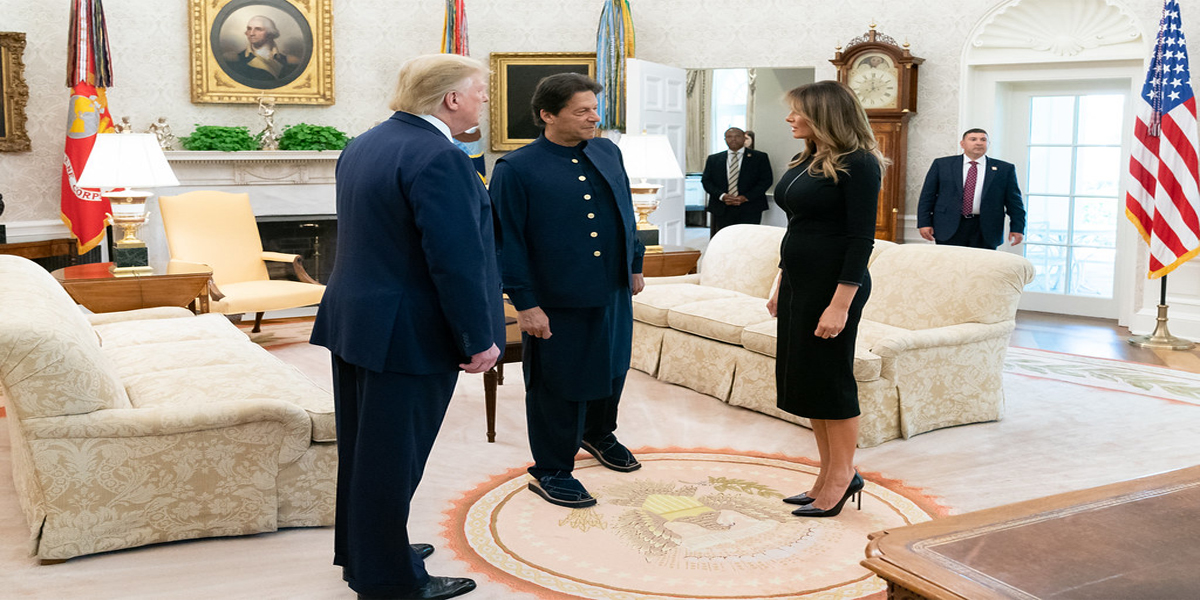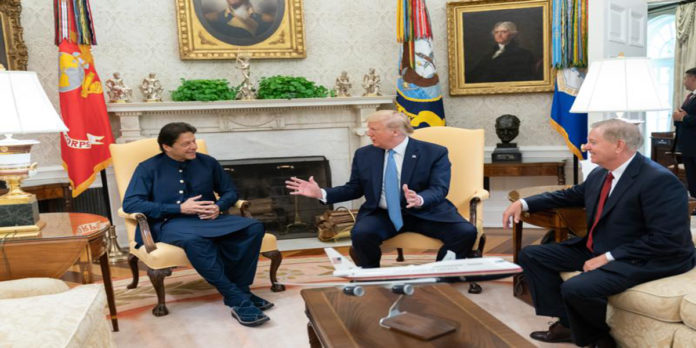US President Donald Trump stated that the United States has never been as close to Pakistan as it is at present. Before meeting with American president, Imran Khan said Islamabad and Washington are on the same page on Afghanistan. He said it was always hoped that the US would take part in tackling the issue because no other country could.
A day after US President Donald Trump called his offer to mediate on the Kashmir dispute, Prime Minister Imran Khan said the United Nations and the United States must act to prevent tensions between nuclear-armed Pakistan and India from reaching a point of no return. Prime Minister Khan said that although Pakistan and India were presently not close to engaging in an all-out conflict, international powers, including the UN and US, must act to prevent tensions between the two nuclear-armed countries from reaching a point of no return.

Keeping in mind the peace policy, Prime Minister Khan said Pakistan had played its active part in helping to ease tensions between the US and Iran as well as reducing tensions between Iran and Saudi Arabia. Calling any escalation between Iran and the US and its allies is a disaster.
Reaffirming Pakistan’s desire for peace and continuity of its efforts for regional stability, Mr Imran Khan said he would talk to President Trump on the situation in Afghanistan. The US president, while referring to Mr Khan as his friend, said he would speak to Indian Prime Minister Narendra Modi about the Kashmir issue. Ahead of meeting with American president, Imran says Islamabad and Washington are on the same page on Afghanistan.
US President Donald Trump reiterated his offer to mediate on the Kashmir dispute. Prime Minister Imran Khan said that the United Nations and the United States “must act” to prevent tensions return. The Prime Minister said he feared that India might attempt to raise conflicts at the border in order to move the world’s focus from domestic protests against two government measures that have been criticized as anti-Muslim.
Things went worse when New Delhi unilaterally annexed occupied Kashmir in August last year. This he named the existing state of affairs in India a “disaster” for the people of India and occupied Kashmir. Prime Minister Khan said the close relationship between India and the US was comprehensible as the former being a market for the latter. But his main worries were the direction in which India was going.
Pakistan is trying to develop state institutions and tightening laws on money laundering. The civil and military relationships are on one page. Imran Khan reiterated Pakistan was on the way to growth after facing a stiff economic period. He had inherited the highest fiscal deficit when his party came to power one year and a half ago. Stock market had gone up and foreign investment had climbed up by 200 per cent in the last year.
You may also like to read: Analysis on Imran – Trump Meeting at Davos by Iftikhar Chaudri
Prime Minister Imran began his speech by talking about his government’s vision on environment and climate change. He said the government object is to plant 10 billion trees over the next four years to deal with the results of climate change. He said forestation was necessary not only because Pakistan was exposed to global warming but also because pollution had become a “silent killer” in cities across the country. Foreign investors are invited to explore Pakistan’s rich potential in tourism, agriculture and gold and copper mining.
Mr Imran Khan stated that one of the biggest difficulties was that Pakistan had faced throughout its history was getting involved in conflict. He said the Soviet conflict in Afghanistan and then the war on terror had catastrophic effects on Pakistan. He said his government had decided that Pakistan would now only partner another country in peace. It has trade potential among the regional countries. The moment Pakistan and India’s relationship becomes normal and trade starts between the two countries, huge opportunities for growth will emerge. The government was doing everything possible to attract investment and give incentives to industries.
Alice Wells, the State Department’s senior official looking after the South Asia file, made some very serious accusation claiming that Pakistan was walking into a debt trap laid by China. The Chinese embassy in Pakistan released a rejoinder to the American official’s criticism. It said that Beijing would be “more than glad” to see the deepening of Pakistan-US ties. In this context sincere advice from our foreign friends is always hailed they should avoid giving Pakistan coaching on how to conduct its foreign policy. Pakistan values its relationship with the US.
The Chinese have rightly pointed out, what Washington has done of recent to help develop Pakistan economically. At this critical time the US should offer trade, investment and assistance. Moreover, if Washington values Pakistan’s friendship, let it publicly back this country’s stance on India-held Kashmir, FATF and other serious matters. Pakistan ties with US are unbreakable and China would continue to work with the Pakistani government and the people to speedily advance the Belt and Road Initiative and CPEC to promote regional peace and development.
China has significantly improved local transportation infrastructure and power supply, created over 75,000 jobs directly and contributed one to two percent of the GDP growth in Pakistan, CPEC is playing an important role in encouraging Pakistan’s socio-economic development and improving people’s livelihood. Under the CPEC, during its planning or execution, every project is equally discussed, carefully studied and jointly implemented by both China and Pakistan.
The Chinese government always requests Chinese companies to operate according to local laws and regulations. All Chinese companies joining the CPEC enjoy an international reputation. All projects strictly follow the market-oriented and internationally accepted business model; adopt state of the art technology and strict environmental protection standards


Comments are closed.